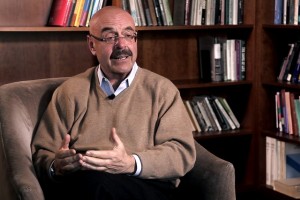Media Literacy
Media scientist Renira Rampazzo Gambarato on the freedom of speech online, netiquette, and the importance of m...
When I was growing up, when I was in university in the US, it was always the idea that you had to do better than what your parents did. The way you did it, the avenue to do it was going into university, getting a degree and then, once you get a degree, there’d be a bunch of companies waiting for you to come out, and then interview with, and then you would find a job, and that job would last 15-20 years. I thought that was the model that we were sold on. When I got out of college, then I got the degree, but there were no companies waiting, there were no interviews waiting, there was no line. Then you start to think: was this worth it? Did I go to the university and waste my time? Did I get the right degree? And I think that’s something that still persists to this day.
However, what has changed is the other end of the spectrum, which are the companies, the organizations that are looking for people to fill the job spots. That sort of dissonance between what we offer as an educational institution and what companies actually need, I think that dissonance has actually grown; there is no linear relationship anymore. I also think what has changed is that we don’t have a shared vision in terms of what our roles are as educational institutions and what are the products that we produce. You look at the companies, and you ask them: what kind of people do you need? And they really don’t have an idea. I think that’s the major challenge that we’re facing now.
I think before we answer that question, we also have to think about where they’re going to land, what kind of jobs are going to be out there in the markets and all this type of stuff. The labour markets are changing: if you look at some of the predictions from the IMF and World Bank and many other, let’s say, businesses that are out there now, it looks as though we’re moving to a point where there are going to be less of these full-time stable positions, and those full-time stable positions might last anywhere like 1-5 years. It could be a condition where those are, let’s say, the most sought but the least available, there’s something in the middle, and then you’ve got, let’s say, labour on demand where you have this gig economy where people are going out looking for jobs, selling themselves, getting something for six months and then waiting for the next project to come along (if it comes along).
So if we look at those two positions, what kind of students should we be producing and what kind of labour is needed, that’s a pretty difficult job, especially if we sit there and say that we have to stick to the traditional way of training people for a specific specialization. When I graduated, I graduated with a degree in international relations; no one knew what that meant, and I still don’t know what it means. It was not like a worthless endeavour; I got to see the world when I was in university, and I got to learn how to speak Russian. I was studying Chinese, so I got a wider perspective on what was in front of me in the world around me. But the advice that I always gave to people after me was to go to university and get a bachelor’s degree, which you can come out with label: accountant, economist, lawyer, or something along those lines, where it was plug and play. You could leave university, and you could make a job application; people knew what the parameters were, and they would hire you because they had positions; there was a structure for you to go into.
Even if those jobs still exist today, those entry level positions are going to be fewer and more difficult to find because entry level means you’re just fulfilling a task, and with the sort of technological revolution that we’re going through now, those positions are going to be taken over by machines.
There’s a great example that was put out there a couple of years ago in the Financial Times where they were talking about entry-level lawyers. Entry-level lawyers just don’t have a bachelor’s degree; you have to go for a master’s degree in law, and what entry-level lawyers, at least in the United States, would be doing was they were research assistants. They would be sitting there, reading all the previous court cases for the firm’s partners, they would assess all the cases from a historical perspective, they would give their points of view on what was important, and it would provide a brief. Now, that brief can be done by a computer program.
So what do we do with those sorts of jobs or those sorts of specializations that actually had a label? Those are going out the window, too. I think we have to prepare kids, our students differently. What I’m considering, what I think is going to be competency-based, no matter what specialization the guys come out with, economist or something like this, they have to come out with a passport of skills. We’ve talked about soft skills for a long time, and that was a big black box where everything that you didn’t do that was measurable was soft skills. Can you negotiate well? That’s a soft skill. Can you discuss things with people who are not from your background or don’t have your specialization? That’s a soft skill.
Now, we’re finding out that states, universities, and even companies are trying to define exactly what competencies their workers need to be successful. That’s one of the things that universities I think need to be focusing on because it’s not just about what books you have read, whether you have read Marx, do you know Keynesian economics, or are you familiar with certain theories. You need to actually know not just the theories: you need to know how to apply them, and you need to know if they’re relevant or not for the circumstances that are outside. That’s a tough sell because parents want to know what they paid their kids’ education for; they want to actually have that passport; they want to say, ‘My kid’s an economist’, so when they go to the golf club next time or the tennis club, and they’re bragging with their friends – ‘Oh, what’s Johnny doing?’ ‘Oh, he’s an accountant over at PricewaterhouseCoopers’ or whatever it is. I think we’re going to have less and less of those people, and when you’re talking about what you are giving them, you’re giving them skills.
So, I think these are the challenges that we’re looking at because everything is being redefined simultaneously. It’s just one of those things where I would hate to be a parent at this point in time, and I would hate to be a student, too, if you’re really really focused on becoming something or someone. If the person is more of a free thinker and more flexible, then I think it’s an amazing time because the opportunities are out there to develop yourself as you want.
The problem is how do you measure success and can we measure success by the parameters which don’t exist anymore which is good salary, pension, stability at work. None of that is there.
I think the biggest difference in the labour markets now compared to when I was in university is that we still had that expectation we’d be in a job for 20 years. My parents, throughout their working life, had two jobs, and that covered 40 years of their life, both of them. It was very, very stable, very easy. If I look at my CV, I’ve changed jobs – the longest stint I had was seven years, and that was in the university as a researcher and professor when I was back in Finland. Then I jumped to a five-year spot in the corporate energy sector, and I already knew in year three that I didn’t want to be there anymore, so I had to figure out something else to do. And then I jumped to something completely different, and then after I finished that stint, I came here.
So you look at my CV, it’s like every three to five years something changes. That’s another thing that we have to prepare our guys for. So, I think success, financial success, and stability all have to go into the back seat. It’s not a priority anymore. I think the priority is finding yourself first skills-wise, personality-wise, so then you can actually make the decisions in the future or that will have an impact on your future so that you may be able to be successful and you may have that sort of stability that you’re looking for.

Media scientist Renira Rampazzo Gambarato on the freedom of speech online, netiquette, and the importance of m...

Economist Deirdre McCloskey on economic development, Adam Smith, and the importance of liberalism

Psychologist Christopher Winship on the causal effects of schooling, similarities between athletics and intell...